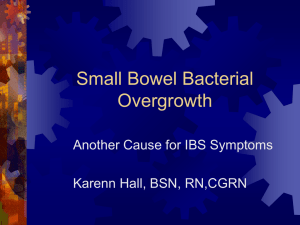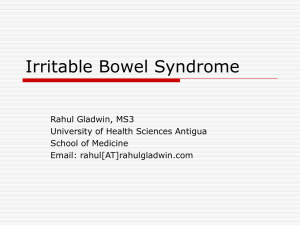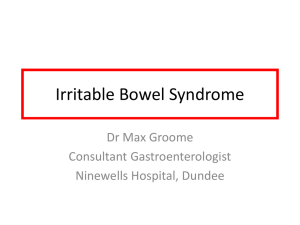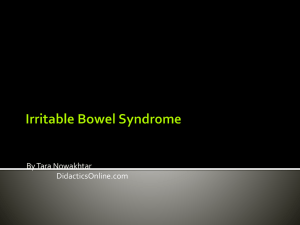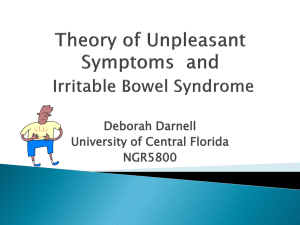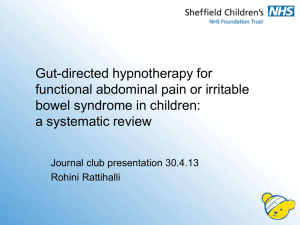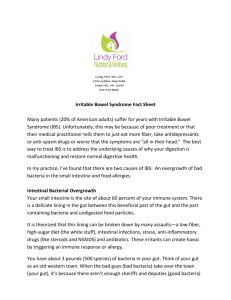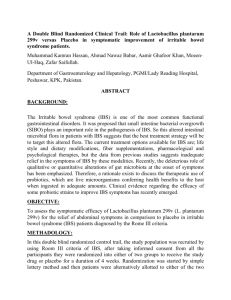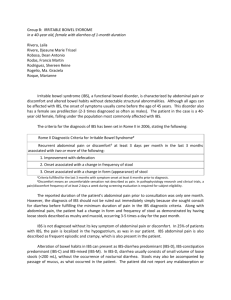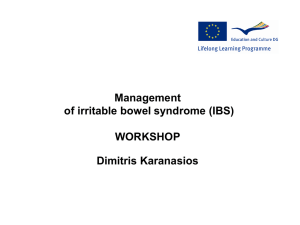What is the treatment for Irritable Bowel Syndrome (IBS)?
advertisement
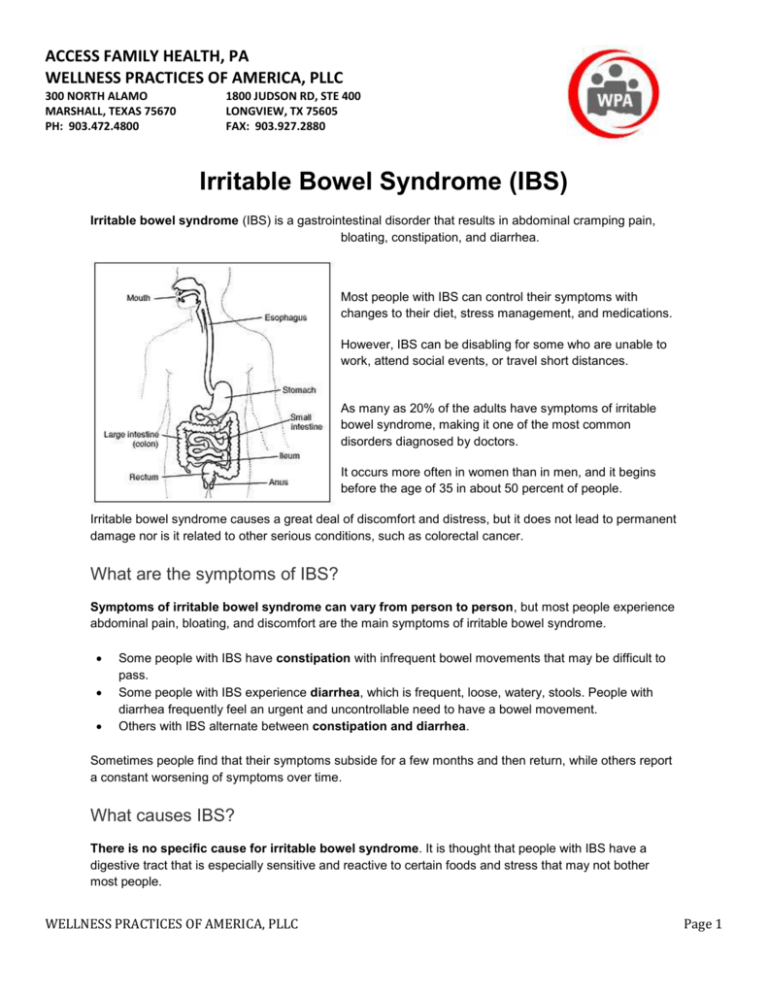
ACCESS FAMILY HEALTH, PA WELLNESS PRACTICES OF AMERICA, PLLC 300 NORTH ALAMO MARSHALL, TEXAS 75670 PH: 903.472.4800 1800 JUDSON RD, STE 400 LONGVIEW, TX 75605 FAX: 903.927.2880 Irritable Bowel Syndrome (IBS) Irritable bowel syndrome (IBS) is a gastrointestinal disorder that results in abdominal cramping pain, bloating, constipation, and diarrhea. Most people with IBS can control their symptoms with changes to their diet, stress management, and medications. However, IBS can be disabling for some who are unable to work, attend social events, or travel short distances. As many as 20% of the adults have symptoms of irritable bowel syndrome, making it one of the most common disorders diagnosed by doctors. It occurs more often in women than in men, and it begins before the age of 35 in about 50 percent of people. Irritable bowel syndrome causes a great deal of discomfort and distress, but it does not lead to permanent damage nor is it related to other serious conditions, such as colorectal cancer. What are the symptoms of IBS? Symptoms of irritable bowel syndrome can vary from person to person, but most people experience abdominal pain, bloating, and discomfort are the main symptoms of irritable bowel syndrome. Some people with IBS have constipation with infrequent bowel movements that may be difficult to pass. Some people with IBS experience diarrhea, which is frequent, loose, watery, stools. People with diarrhea frequently feel an urgent and uncontrollable need to have a bowel movement. Others with IBS alternate between constipation and diarrhea. Sometimes people find that their symptoms subside for a few months and then return, while others report a constant worsening of symptoms over time. What causes IBS? There is no specific cause for irritable bowel syndrome. It is thought that people with IBS have a digestive tract that is especially sensitive and reactive to certain foods and stress that may not bother most people. WELLNESS PRACTICES OF AMERICA, PLLC Page 1 Colonic motility (movement of digested food through the colon) may not be normal in those with IBS. The movement may be spasmodic or can even temporarily stop. Spasms are sudden strong muscle contractions that come and go. Serotonin is found in the intestines and is important for normal digestive functions. Serotonin is a neurotransmitter, or chemical, that delivers messages from one part of your body to another. People with IBS may have abnormal levels of serotonin in the GI tract. Researchers have also found very mild celiac disease in some people with symptoms similar to irritable bowel syndrome. People with celiac disease cannot digest gluten, a substance found in wheat, rye, and barley. People with celiac disease cannot eat these foods without becoming very sick because their immune system responds by damaging the small intestine. Tests for celiac disease may be performed to rule this out as a possible cause of IBS symptoms. How is IBS diagnosed? There is no specific test for irritable bowel syndrome. Other tests may be performed to rule out other possible causes, such as stool sample testing, blood tests, abdominal x-ray, and sigmoidoscopy or colonoscopy. If your test results are negative, the doctor may diagnose irritable bowel syndrome (IBS) based on your symptoms, including how often you have had abdominal pain or discomfort during the past year, when the pain starts and stops in relation to bowel function, and how your bowel frequency and stool consistency have changed. Many doctors refer to a list of specific symptoms that must be present to make a diagnosis of IBS. Symptoms include abdominal pain or discomfort for at least 12 weeks out of the previous 12 months. These 12 weeks do not have to be consecutive. The abdominal pain or discomfort has two of the following three features: It is relieved by having a bowel movement. When it starts, there is a change in how often you have a bowel movement. When it starts, there is a change in the form of the stool or the way it looks. Certain symptoms must also be present, such as: A change in frequency of bowel movements A change in appearance of bowel movements Feelings of uncontrollable urgency to have a bowel movement Difficulty or inability to pass stool Mucus in the stool Bloating Bleeding, fever, weight loss, and persistent severe pain are not symptoms of IBS and may indicate other problems such as inflammation, or rarely, cancer. The following have been associated with a worsening of IBS symptoms: Large meals Bloating from gas in the colon WELLNESS PRACTICES OF AMERICA, PLLC Page 2 Medicines Wheat, rye, barley, chocolate, milk products, or alcohol Drinks with caffeine, such as coffee, tea, or colas Stress, conflict, or emotional upsets Researchers have found that women with irritable bowel syndrome may have more symptoms during their menstrual periods, suggesting that reproductive hormones can worsen IBS problems. In addition, people with IBS frequently suffer from fibromyalgia, depression and anxiety, all of which can worsen symptoms. Similarly, the symptoms associated with IBS can cause a person to feel depressed and anxious. What is the treatment for Irritable Bowel Syndrome (IBS)? There is no cure for irritable bowel syndrome, but there are many treatment options available that can lessen or eliminate symptoms. Your doctor will give you the best treatments for your particular symptoms and encourage you to manage stress and make changes to your diet. Medications are an important part of relieving symptoms. Your doctor may suggest fiber supplements or laxatives for constipation or medicines to decrease diarrhea, such as loperamide (Imodi um). An antispasmodic is commonly prescribed, which helps to control colon muscle spasms and reduce abdominal pain. Antidepressants may relieve some symptoms. However, both antispasmodics and antidepressants can worsen constipation, so some doctors will also prescribe medications that relax muscles in the bladder and intestines. There are several medications available to specifically treat irritable bowel syndrome Alosetron (Lotronex). Lotronex has been reapproved by the U.S. FDA with significant restrictions for women with severe IBS who have not responded to conventional therapy and whose primary symptom is diarrhea. However, even in these patients, Lotronex should be used with caution Lubiprostone (Amitiza). Amitiza is approved for women age 18 and older who have IBS with constipation. Its effectiveness in men has not been shown. Amitiza is a chloride channel activator that increases fluid secretion into the small intestine to help with the passage of stool. Common side effects include nausea, diarrhea and abdominal pain. The drug is generally prescribed for women with IBS and severe constipation for whom other treatments have not been successful. It is important to follow your doctor’s instructions regarding the use of any medication, including over-the-counter medications such as laxatives and fiber supplements. Some people report a worsening in abdominal bloating and gas from increased fiber intake, and laxatives can be habit forming if they are used too frequently. Medications affect people differently, and no one medication or combination of medications will work for everyone with IBS. You will need to work with your doctor to find the best combination of medicine, diet, counseling, and support to control your symptoms. WELLNESS PRACTICES OF AMERICA, PLLC Page 3 How does stress affect IBS? Stress—feeling mentally or emotionally tense, troubled, angry, or overwhelmed—can stimulate colon spasms in people with IBS. The colon has many nerves that connect it to the brain. Like the heart and the lungs, the colon is partly controlled by the autonomic nervous system, which responds to stress. These nerves control the normal contractions of the colon and cause abdominal discomfort at stressful times. People often experience cramps or “butterflies” when they are nervous or upset. In people with IBS, the colon can be overly responsive to even slight conflict or stress. Stress makes the mind more aware of the sensations that arise in the colon, making the person perceive these sensations as unpleasant. Some evidence suggests that IBS is affected by the immune system, which fights infection in the body. The immune system is affected by stress. For all these reasons, stress management is an important part of treatment for IBS. Stress management options include: Stress reduction (relaxation) training and relaxation therapies such as meditation Counseling and support Regular exercise such as walking or yoga Changes to the stressful situations in your life Adequate sleep Can changes in diet help IBS? Careful eating reduces IBS symptoms for many people. Before changing your diet, keep a journal noting the foods that seem to cause distress. Then discuss your findings with your doctor. You may want to consult a registered dietitian who can help you make changes to your diet. For instance, if dairy products cause your symptoms to flare up, you can try eating less of those foods. You might be able to tolerate yogurt better than other dairy products because it contains bacteria that supply the enzyme needed to digest lactose, the sugar found in milk products. Dairy products are an important source of calcium and other nutrients. If you need to avoid dairy products, be sure to get adequate nutrients in the foods you substitute, or take supplements. In many cases, dietary fiber may lessen IBS symptoms, particularly constipation. However, it may not help with lowering pain or decreasing diarrhea. Whole grain breads and cereals, fruits, and vegetables are good sources of fiber. High-fiber diets keep the colon mildly distended, which may help prevent spasms. Some forms of fiber keep water in the stool, thereby preventing hard stools that are difficult to pass. Doctors usually recommend a diet with enough fiber to produce soft, painless bowel movements. High-fiber diets may cause gas and bloating, although some people report that these symptoms go away within a few weeks. Increasing fiber intake by 2 to 3 grams per day will help reduce the risk of increased gas and bloating. Drinking six to eight glasses of plain water a day is important, especially if you have diarrhea. Drinking carbonated beverages, such as sodas, may result in gas and cause discomfort. Chewing gum and eating too quickly can lead to swallowing air, which also leads to gas. Large meals can cause cramping and diarrhea, so eating smaller meals more often, or eating smaller portions, may help IBS symptoms. Eating meals that are low in fat and high in carbohydrates such as pasta, rice, whole-grain breads and cereals (unless you have celiac disease), fruits, and vegetables may help. WELLNESS PRACTICES OF AMERICA, PLLC Page 4
